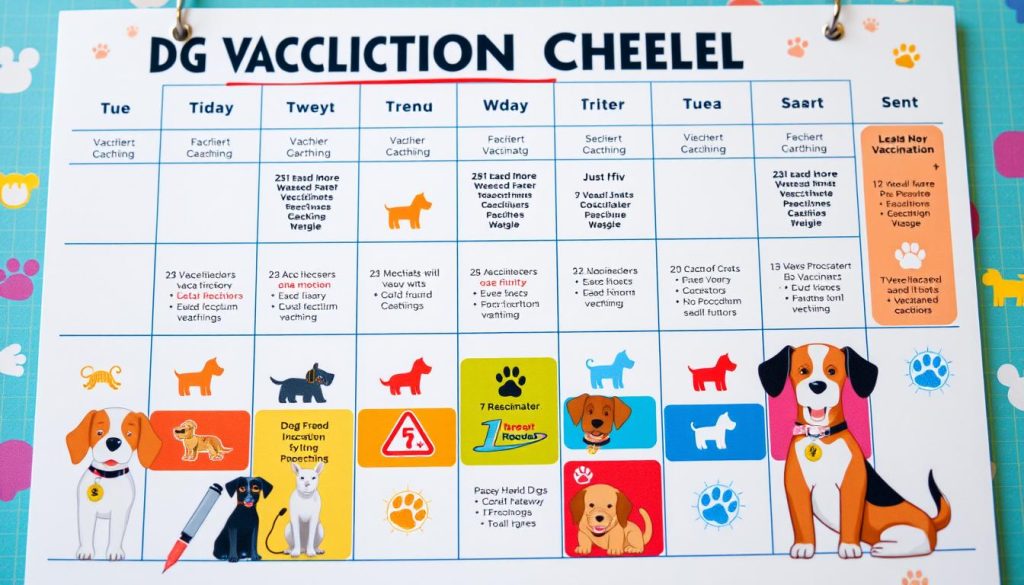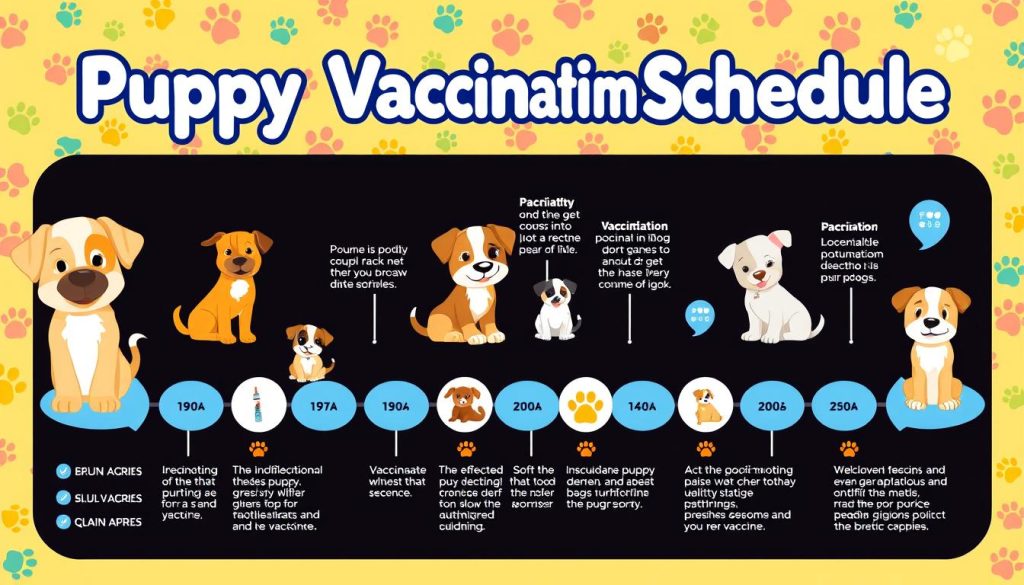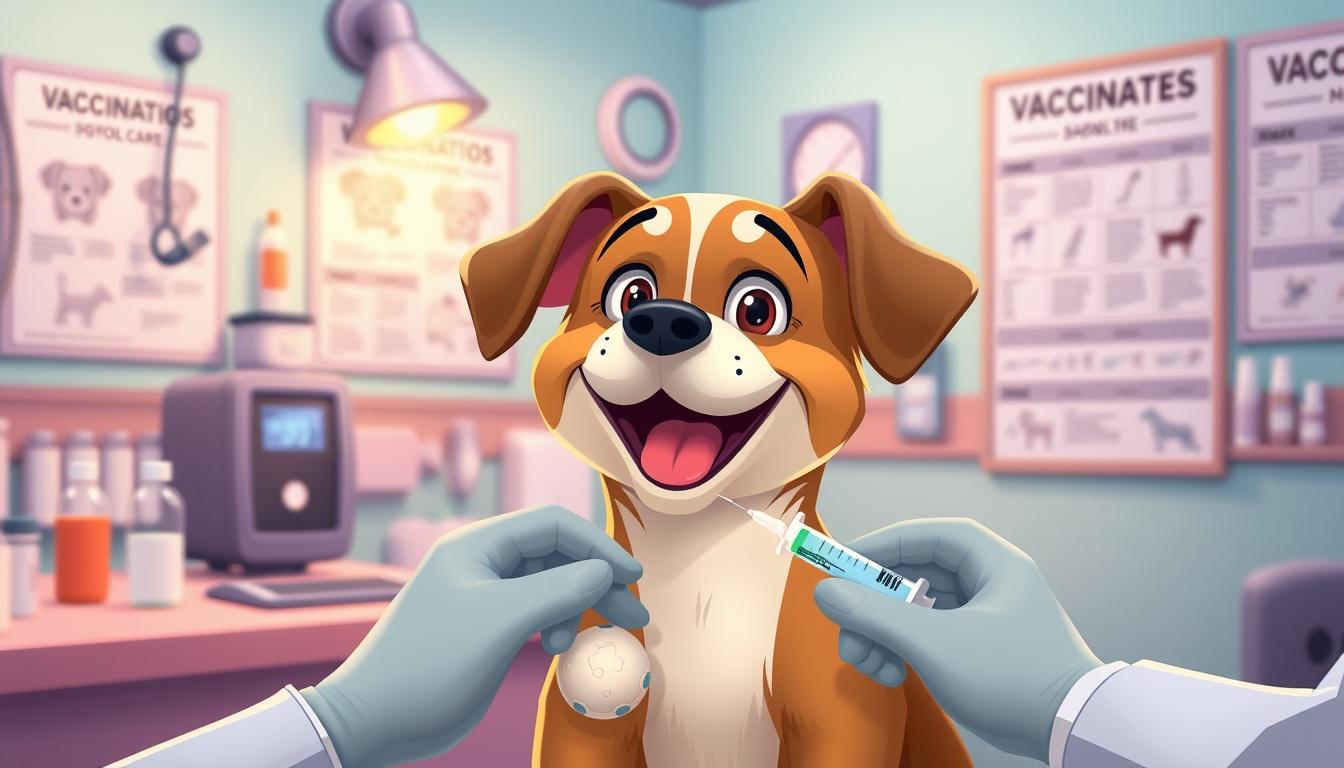As a devoted pet parent, I know how important my dog’s health is. Keeping them healthy means following a dog vaccination schedule closely. This guide will help me understand the vaccination process and the different stages.
It’s crucial to keep my pup’s vaccinations up-to-date. This not only shows I’m a responsible pet owner but also protects my dog’s health. Knowing the canine vaccination schedule helps me prevent diseases and keep my dog well.
Whether my dog is a puppy or an adult, this guide will help me. It gives me the info I need to make the right choices for my dog’s health and happiness.
Understanding the Importance of Vaccinating Your Furry Companion
Keeping your dog healthy is a big deal. One key step is making sure they get the right vaccinations. Vaccines help keep your dog safe from serious diseases. Knowing why vaccinations are important helps you protect your pet.
Why Vaccines Matter for Your Dog’s Health
Vaccines help your dog’s body fight off diseases. They are very good at preventing illnesses like parvovirus and rabies. Keeping your dog’s vaccinations up-to-date is the best way to protect them.
Common Misconceptions About Pet Vaccinations
Some people think vaccines are bad or not needed if their dog stays inside. But these ideas are often wrong. It’s smart to talk to your vet to clear up any myths and make sure your dog gets the care they need.
Understanding the value of dog vaccinations helps you make better choices for your pet’s health. Keeping your dog’s vaccinations current is a simple way to keep them safe and healthy.
Dog Vaccination Schedule: A Comprehensive Overview

Understanding the dog vaccination schedule can be tough for pet owners. Knowing the timeline and key vaccines is key for your dog’s health. Let’s dive into the vaccination needs for dogs.
Core Vaccines for Dogs
The core vaccines are vital for all dogs. They protect against serious diseases. These include:
- Distemper
- Parvovirus
- Coronavirus
- Adenovirus
- Rabies
Non-Core Vaccines for Dogs
There are also non-core vaccines for dogs. These depend on your dog’s lifestyle and risk. These include:
- Bordetella (kennel cough)
- Leptospirosis
- Canine Influenza
- Lyme disease
When to give these vaccines varies. It’s key to work with your vet to get the right shots at the right time.
| Vaccine | Initial Vaccination | Booster Shots |
|---|---|---|
| Distemper, Parvovirus, Coronavirus, Adenovirus | 6-8 weeks, 10-12 weeks, 14-16 weeks | 1 year, then every 1-3 years |
| Rabies | 12-16 weeks | 1 year, then every 1-3 years |
| Bordetella | Every 6-12 months | N/A |
| Leptospirosis | 8-10 weeks, 12 weeks | 1 year, then annually |
| Canine Influenza | 2-4 weeks apart | Annually |
| Lyme Disease | 8-10 weeks, 12 weeks | 1 year, then annually |
The vaccination schedule varies by dog’s age, breed, and health. Always check with your vet to ensure your dog gets the right care.
Puppy Vaccination Series: Protecting the Youngest Pups

As a new pet parent, keeping your furry friend healthy is key. The puppy vaccination series is vital for their immunity and protection from diseases. We’ll explore when to start vaccinations and the core and non-core vaccines needed for your puppy’s health.
When to Start Puppy Vaccinations
The puppy vaccination schedule starts when your pup is 6-8 weeks old. This first set of shots is crucial for their immune system. Boosters are given every 3-4 weeks until they’re 16 weeks old. It’s important to stick to this schedule for the best protection.
Core and Non-Core Vaccines for Puppies
The puppy vaccination schedule includes both core and non-core vaccines. Core vaccines are vital for all puppies and include:
- Distemper
- Parvovirus
- Canine hepatitis
- Rabies
Non-core vaccines depend on your pup’s lifestyle, risk factors, and location. These may include:
- Bordetella (kennel cough)
- Leptospirosis
- Coronavirus
- Canine influenza
Your vet will help choose the right core puppy vaccines and non-core puppy vaccines for your pup. This ensures they get the best protection.
Adult Dog Vaccination Requirements
Keeping your adult dog’s vaccinations up to date is just as important as their puppy shots. As they get older, they might need booster shots to stay healthy. These shots help protect them from many illnesses.
Booster Shots and Annual Checkups
Adult dogs need booster shots regularly. These are usually given every year or every three years, depending on the vaccine. These shots boost your dog’s immune system and protect them from diseases.
It’s also important to take your dog for annual vet check-ups. Your vet will check your dog’s vaccination history and suggest any needed shots or vaccines. This way, you keep your dog safe from serious diseases.

